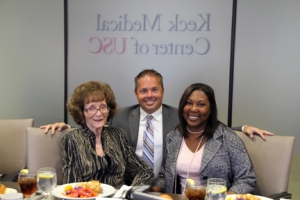By Amy E. Hamaker
Bernice Christenson has a long history with USC, beginning with her time studying for her master’s degree in education in 1955. She was a founding member of the Keck Hospital of USC Hospital Guild, and president in 1995; she received the Widney Alumni House Award in 1997 for outstanding leadership, volunteerism and loyalty to the university.

Keck Hospital of USC and USC Norris Cancer Hospital CEO, Scott Evans, PharmD, and Luanda Grazette (right), MD, MPH, associate professor of clinical medicine at the Keck School of USC, celebrate the gift of a Cheetah NICOM monitor from Bernice Christenson (left) at a special luncheon in Christenson’s honor.
(Photo/Amy E. Hamaker)
At 95 years old, Christenson continues her support of USC through the gift to Keck Hospital of USC of $15,000 for a noninvasive monitor that will help physicians to better evaluate cardiac conditions with less discomfort to patients.
The Cheetah NICOM hemodynamic monitor will provide measurements of cardiac function that would otherwise be available only through invasive cardiac catheterization.
“When we’re trying to assess the fluid status in relation to the heart function, we use an invasive method called a Swan-Ganz catheter,” explained Luanda Grazette, MD, MPH, during a recent luncheon celebrating Christenson’s gift. “This catheter allows us to access the heart using a catheter placed through a vein in the neck. In this way we measure the heart’s pressures and function. It’s an important procedure, but it is invasive, uncomfortable and can only be used in critical care settings.”
Instead, said Grazette, who is an associate professor of clinical medicine at the Keck School of Medicine of USC, the new monitor uses adhesive backed sensors attached to the skin to measure bioreactance. The measurements provide similar information to the Swan-Ganz catheter without the invasiveness.
“As we start moving into large-scale specialty clinics, noninvasive equipment like this will also be helpful to give instant feedback to diagnosticians in those locations,” added Scott Evans, PharmD, CEO of Keck Hospital and USC Norris Cancer Hospital, who visited the luncheon. “That’s what makes this gift is so important — it allow us to see how we might bring on cardiovascular thoracic institute sites in the Los Angeles area.”
Previously, Christenson has been involved in giving toward scholarships for Keck School of Medicine of USC students. But after her own experiences as a patient, she knew she wanted other patients to have extra security of knowing that the procedures they consider are the right course of treatment, particularly when it comes to major surgery.
“I believe it’s essential for the hospital to have new, innovative machines that help patients,” said Christenson. “It means that doctors will be better able to help patients, and patients will be able to leave and get back to their lives more quickly.”
The amount of the gift isn’t the important thing for Christenson — it’s a matter of supporting medical staff. “Very often people can give a small gift; if you take all those small gifts and put them together, then you have a really large amount to help contribute to the doctors’ efforts,” she said. “It’s important that the doctors know they’re being supported so they can fight on.”

